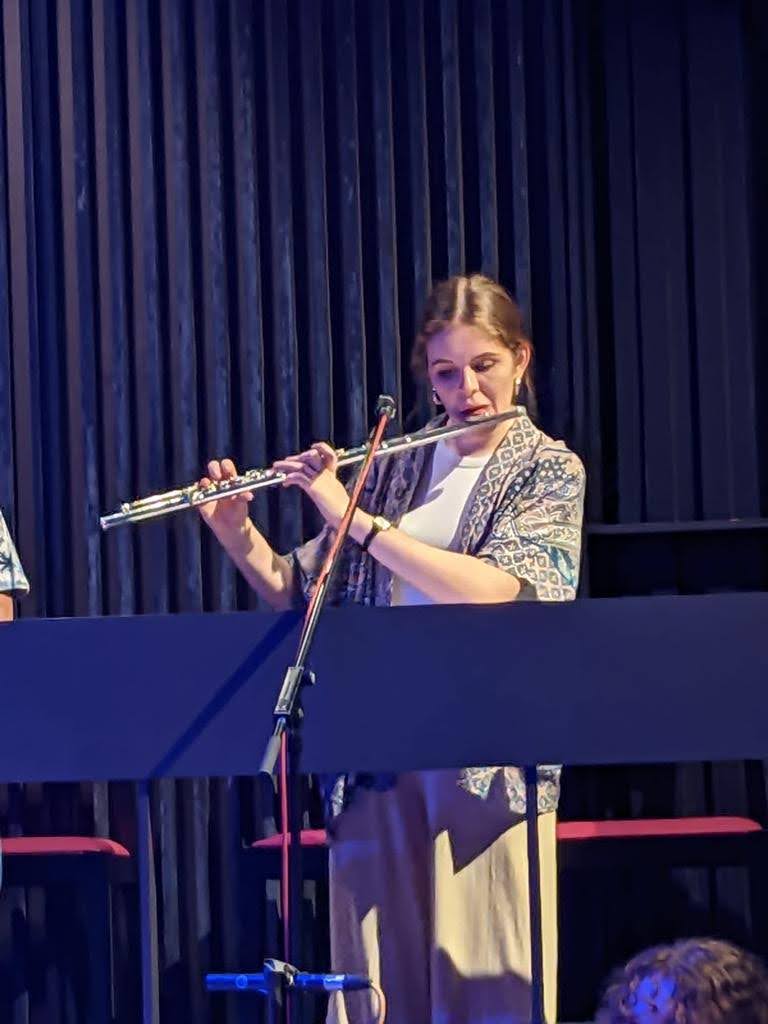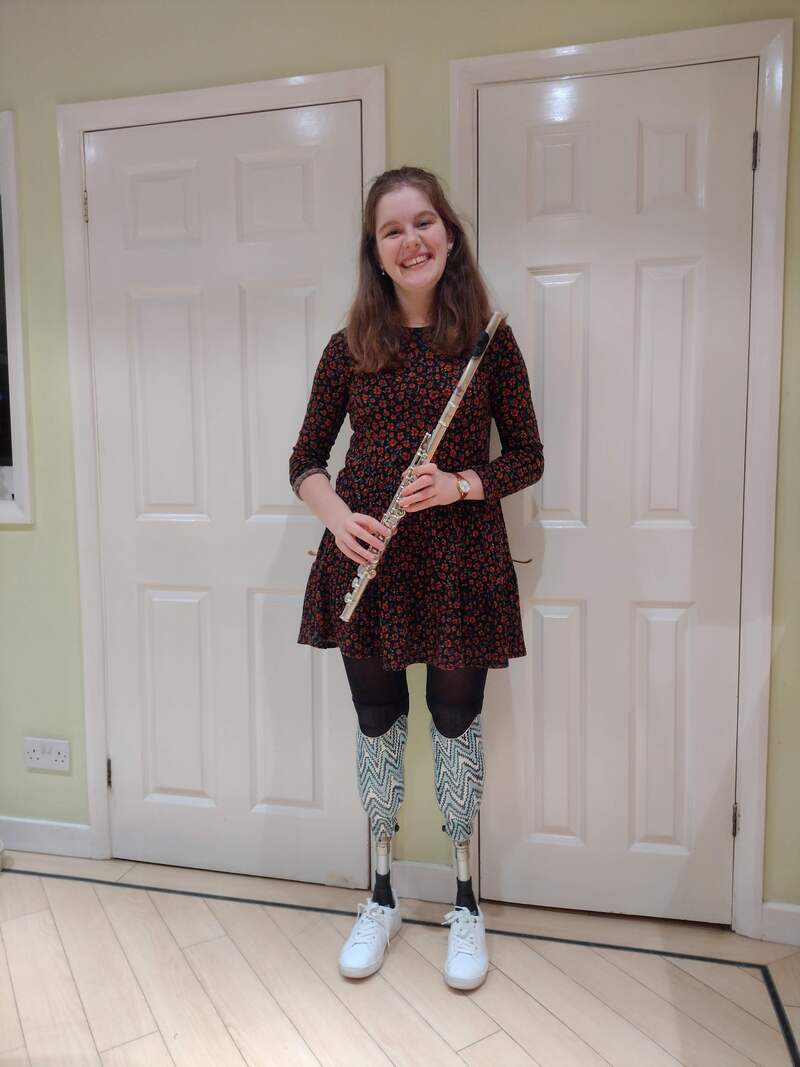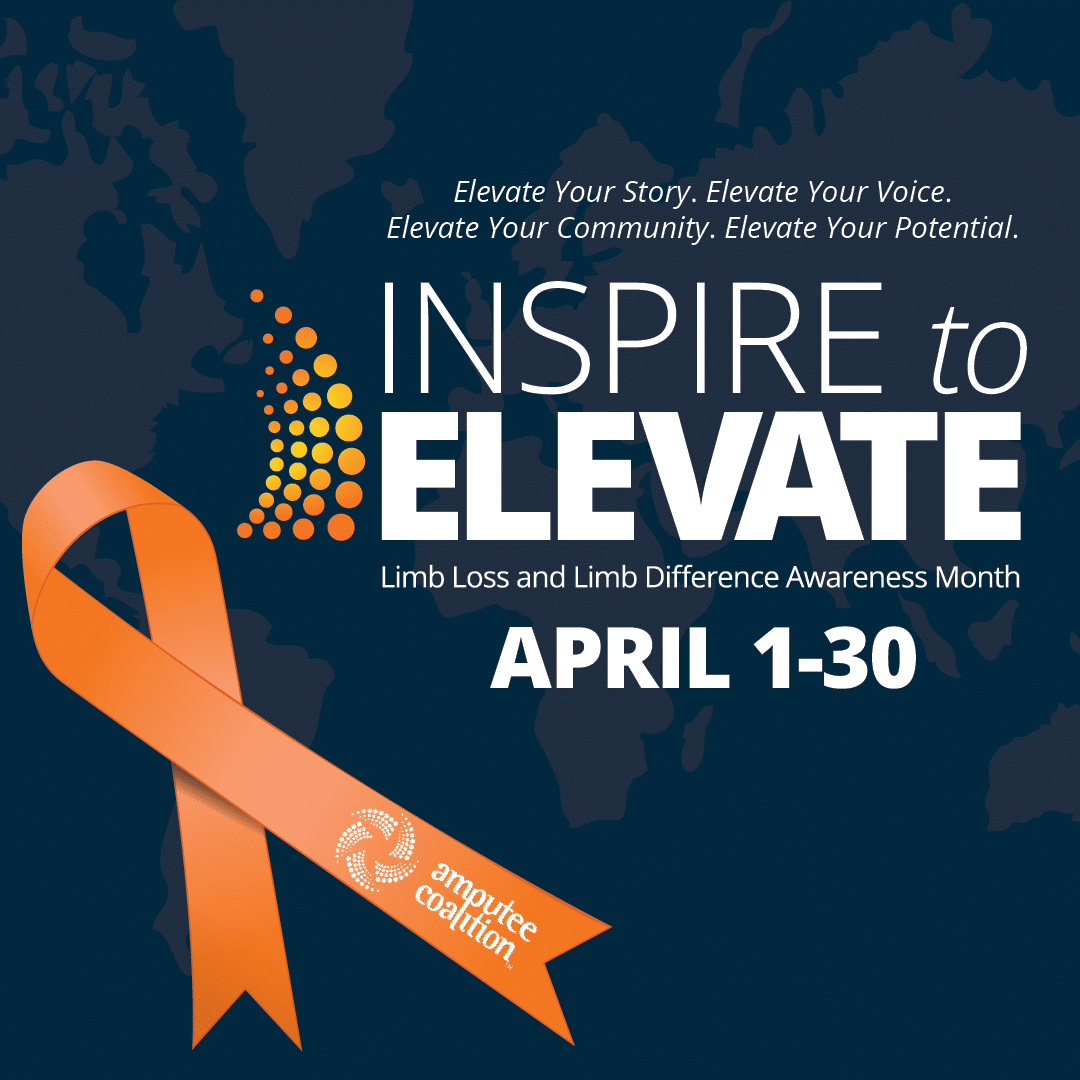|
Emma Brown joined OHMI as our youngest trustee in 2022. One year on and, particularly as we celebrate Limb Loss and Limb Difference Awareness Month this month, it’s a good point at which to hear more of her experiences – as OHMI trustee, talented flautist and amputee.
Emma brings us up to date. “Life is pretty busy for me at the moment! I’m currently studying for my Masters in Flute Performance at Birmingham Conservatoire. My studies had been deferred for a year, following a life-changing injury in May 2021 which resulted in bilateral amputations below the knee. It was whilst I was undergoing rehabilitation at Queen Mary’s Hospital, Roehampton, that I realised almost all the activities suggested to amputees are sports related. I have never been particularly sporty so there was nothing on offer that held any great appeal. My unfailing passion has, and always will be, music, and I was determined to continue with that. The importance of music in recovery Being in a neck brace for some five months gave me a real insight into how it feels to be prevented from making music. As a flautist, that time was beyond frustrating but it did provide me with the opportunity, at least, to practise the piano, with my injury forcing me to rely on the pedals less and play better as a result. The ability to make music during such a period of seismic change was so integral to my recovery. Life as an amputee musician I realised early on that life as an amputee musician can be challenging, particularly when performing in an orchestra. As well as the additional considerations of getting from A to B (with musical instrument in tow and often relying on public transport), there’s the expectation that musicians join and exit the stage at lightning pace. Added to that, it is typical to stand between performances, and moving from seated to standing position so often can be pretty tiring. There are also other practicalities to consider, particularly in older theatres and music halls where the disabled toilet is unlikely to be anywhere near the stage. These experiences have brought into sharp focus the hurdles an amputee or wheelchair user faces when they seek to perform. It is what led to me setting up my own network, Amputee Musicians UK, which aims to connect people with limb difference or loss who love either playing or listening to music. I've certainly learnt a lot since commencing my studies at Conservatoire. It's inevitable that I will have ‘bad leg days’ since it’s only been two years since my injury, and I’ve only recently started to live independently. My prosthetics are a mobility aid in the same way as my manual wheelchair, and there are times the wheelchair presents the better option. As the first wheelchair user to study music at Conservatoire, there have been a few hiccups along the way – simply because such accessibility issues have never presented themselves before. Some – such as the difficulty in accessing the Winds section (always one step up) – apply to every orchestra. Others will be unique to that particular environment - in the Conservatoire’s case, it's the fact that the door to the woodwind store cupboard is unbelievably heavy. I'm pleased to say both issues were quickly addressed. I was really delighted that the Conservatoire also invited OHMI’s General Manager, Rachel Wolffsohn, to lead a workshop to help raise awareness of accessibility in music. It was really well-received by my fellow students who understand that they may well find themselves teaching disabled musicians in the future. I’ve had the opportunity to advocate for disabled students in other ways. As a Conservatoire student, I also belong to Birmingham City University where the number of disabled students means there's a huge amount of disabled support. The university has recently lowered one of its printers for use by disabled students. I was asked to test its suitability and, in return for my feedback, was offered extra printing credits. Playing the one-handed flute I see my role as an OHMI trustee as two-fold. Firstly, the empathy I can show to my disabled students when I teach. I’ve thoroughly enjoyed teaching the one-handed recorder at recent session of OHMI Music-Makers. Secondly, the part I can play in helping to increase awareness of opportunities open to amputees. When I recently fractured my right hand, I faced the prospect of going back to my parents in Surrey to wait out the five weeks until my cast was removed. Being offered one of OHMI’s one-handed flutes has given me both purpose and a reason to stay in Birmingham. I will, of course, go back to my regular flute once my hand is healed but, for now, the one-handed version is helping me to retain my sound and quality. It has also allowed me to continue playing in my Minerva flute quartet, our most recent gig being a local retirement home. My next OHMI project is to ensure that hospital Prosthetic departments know as much about music-making as they do sport activities. For anyone recovering from injury, music is, after all, as important mentally as sport is physically. There is still a lot to do if the industry is to be truly accessible for the disabled, and I am certainly committed to helping to change that! |
CategoriesArchives
June 2024
|




 RSS Feed
RSS Feed
